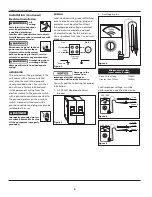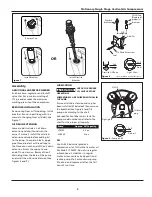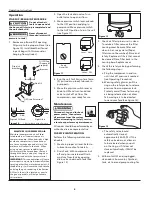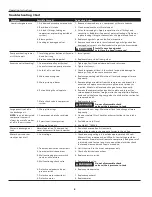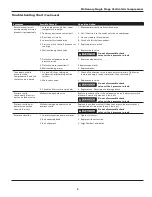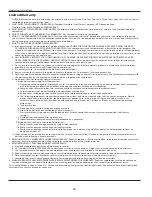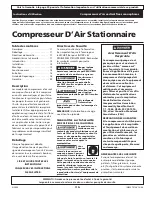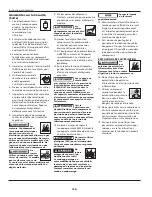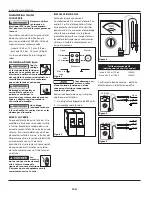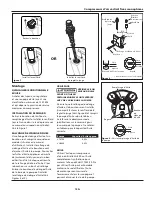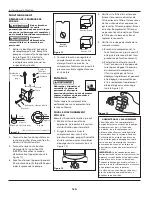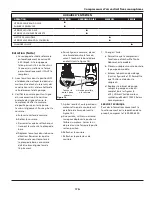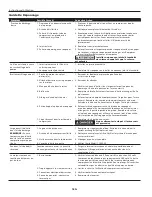
3
Stationary Single Stage Vertical Air Compressors
Introduction
Refer to Figure 1 .
InSTAllInG A ShUT-OFF VAlVe
A shut-off valve should be installed
on the discharge port of the tank to
control the air flow out of the tank . The
valve should be located between the
tank and the piping system .
pressure switch -
Auto/Off Switch - In
the "auto" position, the compressor
shuts off automatically when tank
pressure reaches the maximum preset
pressure . After air is used from the tank
and drops to a preset low level, the
pressure switch automatically turns the
motor back on . In the "off" position,
the compressor will not operate . This
switch should be in the "off" position
when connecting or disconnecting the
power cord from the electrical outlet .
When the pressure switch turns the
motor off you will hear air leaking out
of the pressure switch unloader valve
for a short time . This releases the air
pressure from the discharge tube and
allows the compressor to restart easier .
For units without a manual switch,
whenever the procedures call for
turning the switch to the OFF position,
use the switch at the disconnect instead .
Regulator -
The regulator controls the
amount of air pressure released at the
hose outlet (Sold separately) .
ASMe Safety Valve -
This valve
automatically releases air if the tank
pressure exceeds the preset maximum .
Discharge tube -
This tube carries
compressed air from the pump to the
check valve . This tube becomes very hot
during use . To avoid the risk of severe
burns, never touch the discharge tube .
Check valve -
One-way valve that
allows air to enter the tank, but
prevents air in the tank from flowing
back into the compressor pump .
Belt Guard -
Covers the belt, motor
pulley and flywheel .
Tank Drain Valve -
This valve is located
on the bottom of the tank . Use this
valve to drain moisture from the tank
daily to reduce the risk of corrosion .
MOUnTInG
Never use the wood
shipping skids for
mounting the compressor.
FLOOR MOUNTING (ALL UNITS)
The compressor feet
MUST
be bolted to
a flat, even, concrete floor or separate
concrete foundation . Vibration isolators
must be
used between the tank leg
and the floor (Part number MP346100AJ
available separately) . Do not draw
bolts tight . Allow the pads to absorb
vibrations . A flexible coupling should be
installed between the tank and service
piping .
This compressor is
extremely top heavy.
The unit must be bolted to the floor
with isolation pads before operating to
prevent equipment damage, injury or
death.
Never install a shut-
off valve between
the compressor pump and the tank.
Personal injury and/or equipment
damage may occur.
pIpInG
Never use plastic
(PVC) pipe for
compressed air. Serious injury or death
could result.
Any tube, pipe, or hose used must have
a pressure rating higher then 150 psi .
Minimum recommended pipe size:
- up to 50 feet long use 1/2 inch
- greater than 50 feet long use 3/4 inch
Larger diameter pipe is always better .
Installation
Disconnect, tag and lock out
power source, then release
all pressure from the system
before attempting to install, service,
relocate or perform any maintenance.
lOCATIOn
This compressor is
not intended for
outdoor installation.
It is extremely important to install the
compressor in a clean, well ventilated
area where the surrounding air
temperature will not be more than
100°F .
Provide a minimum clearance of
18 inches between the compressor
flywheel or fan to the wall and ensure
clear access to the drain valve to
facilitate condensate drainage .
Do not locate the compressor air inlet
near steam, paint spray, sandblast areas
or any other source of contamination .
Tank Drain Valve
Discharge Tube
Belt Guard
Check
Valve
Safety
Valve
Pressure
Switch
Tank
Outlet /
Discharge
Port
Tank
Pressure
Gauge
Figure 1 -
Some compressors may have a
different appearance, but they
have similar parts .




